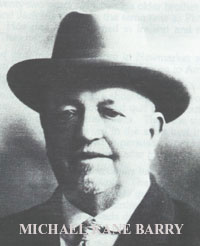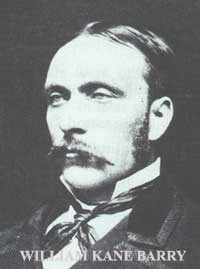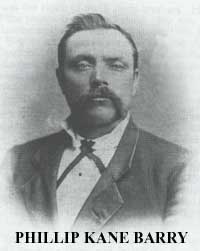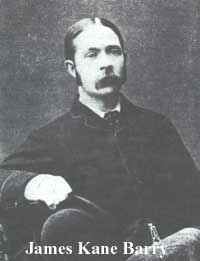 Irish Sheepherders of Lake County Oregon
Irish Sheepherders of Lake County Oregon 
By Eileene Barry McKee




Dr. Daly
Sheep Owners
Photo's
Stories
1912 Irish News
Lakeview Irish In The News
Irish Ranchers Today
Irish Obituries
Irish Room
Irish Immigrants
Census
1880
1890
1900
1910
1920
1930
Contact
Jim Deely
There are countless scores of Irish and their descendants from Lake County, Oregon, who are perhaps unaware of how greatly the four Barry Brothers, who originally came to this part of the of the west, impacted their life's.
These men were instrumental in bringing most of the original Irish immigrates to Lake County. They arrived while the present Warner Valley was still part of Grant County. But from their arrival in 1877, and for the next 50 years, these four Brothers provided jobs for their relatives and friends from the Newmarket area of County Cork, Ireland.The Barry's worked with them, advised them, taught them about this new strange country, and watched them take their place in the community.
There was eight Barry Brothers who were raised in the Rockchapel area near Newmarket, Co. Cork Ireland, all but one them spent time in the new town Lakeview and ran their sheep in the sagebrush lands to the east of town. Three of the boys elected to return to San Francisco, but the eldest four remained to homestead ranches, bring their children over from Ireland, increase their herds and become part of the ambience of the country.
Since the Irish have a tradition of naming their children after relatives and incorporating the name of the godfather into the child's name, some names are repeated many times in a family, being used freely among the cousins, aunts, uncles and grandparents.
The father's name is perhaps Michael, his eldest son will be called Michael after it's grandfather. His brother will undoubtedly be called his oldest son Michael also, honoring his grandfather and if there are other brothers in the family, their eldest son will also be called Michael. It makes sense to the Irish but drives others to the point of frustration as they try to determine which Michael all with the same last name, one is talking about or directing mail to.
Because of these customs each of the original eight Barry brothers were refereed to as Old Phil, Old Mike, Old Bill, Old Jim, Old Bob and so on.Old Phil had a son named Phil whose godfather was named Phil. This child was baptized Phillip Philip, or Approbatory. Their was Long Mike Barry, Little Mike Barry, Mickey the Mike Barry, Mike Phil, Jere Barry, Mike Comer Barry, and of course, Old Mike Barry, all cousins living in Lake County Oregon and confusing to the Locals.
When Old Phil, Old Jim and their brothers came to America they had no intention or thought they would someday become legends or that they would start a dynasty of sorts that is now spread over the world. They were desperate, hard working, driven men, whose families were starving in Ireland. They were determined to save those children and as many of their neighbors and friends as possible. They took advantage of every opportunity that they could find, often at great sacrifice, and they evenly brought their children, relatives, friends and neighbors to a new life in Lake county Oregon.
Phillip Kane Barry was the oldest of eight brothers. He was born in 1841 and five years later the potato famine hit Ireland. The country spent many years recovering from the famine and very few of the Catholic Irish were considered even well off. They were referred to as the Irish peasants, but they stubbornly tried to see that their children were educated. In the archives in Lakeview Oregon, out of nearly 400 Irish men who applied for citizenship, we found only one who was unable to write his name and made a mark instead.
Phil Kane barry married Honora Dugan on Nov. 25th, 1864. He was 23 and she was 19. In the next ten years the couple had five children: Honorah Eileen (O'Shea) born 1865; Michael (Little Mike) born in 1867; John (Jack) born Nov. 17th, 1869; Mary (Conway) born 1872 and Phil, (Gold Tooth Phil) born Nov, 1875.
Because of the times in Ireland were still desperately hard and famine again spread over the land. Jim Kane Barry and Jack Kane Barry, younger unmarried brothers of Phil's, determined to leave for America. What ever happened, Phil Barry left Ireland in 1874 before his brothers, leaving Hanora pregnant with their fifth child. He arrived in New York before his brothers. When the other two brothers arrived, the three Barry's took a ship from New York and went down the East Coast to Chartes Panama, where they crossed the Isthmus and found a ship on the west Coast of Panama which took them to San Francisco.
The three brothers went to work Daughterly, from Daughterly's Station, in the center of the present city of Dublin California, across the Bay from San Francisco. Jim soon left and went into San Francisco where he found work. In those days a man usually got a dollar a day, when he worked with sheep or cattle. Usually, at the end of the month the owner didn't have the ready cash to pay them, so he would give them five or six head of sheep as wages. Phil and Jack chose to take ewe's and the end of the year they had 70 or so head of sheep.
In the spring, if they had a successful lambing, they would have 140 head. After the shearing in the spring, they would brand the sheep with there own brand but continue to run them along with Daughterly's herd. After a few years their band of sheep were so numerous that they had to quit Daughterly and head out into the open range seeking grazing and water for their band of sheep.
Phil and Jack started out and trailed their sheep to the Oregon Country. Neither of them knew were they were going but hoped to find a place, not too crowded, where they could run the herd of sheep. An Indian whom they met the year before in the wilderness beyond Hang town in California had told them, he thought the area beyond Ft Bidwell in the Northeast section of California would be good country for sheep. with that tenuous bit of information, they took there sheep their into the Warner Valley, of Lake County Oregon.
Meanwhile, another brother arrived from Ireland. Mike Kane Barry, who was married, left his wife and baby in Newmarket and came to America and went to work for Daugherty. He too, took sheep instead of wages and soon had a herd of his own. two years after Phil came to Oregon, Mike drove an additional band of sheep up from Livermore, California, and joined Phil and Jack in the desert of Lake County.
The brothers helped each other and cooperated with each other in finding adequate grazing and water in the sagebrush desert. They trailed their sheep all over central and eastern Oregon, up a short distant into Idaho, and well into the Nevada desert. Soon they were more familiar with the range, than many of the Cattlemen who still hoped to drive them out.
In the fall, when the brothers sold their wether lambs, and in the spring when they sold their wool they would send money home to their families in Ireland. In those days a laborer, in Ireland,working for an English landlord was paid twelve dollars a year. A very skilled worker might be able to earn 20 dollars a year, so the money sent home seemed like a fortune to the families, relatives and neighbors who knew about it.
Soon a flood of young Irishmen were leaving their homes in Ireland, bound for lake County, to make their fortunes in the sheep business. William Kane Barry known as Old Bill followed his older brothers to Oregon within a few years, and left a wife and three young children behind in Newmarket. He established a ranch in Plush near his brothers and soon prospered in the sheep business.
By this time the brothers were utilizing the wild mustangs that were numerous in those days and ran free in the desert. The brothers tamed the horses and used them on their ranches. In later years they broke the horses and sold them for saddle horses or for work horses.
Huge bands of sheep roamed the desert and mountains, which was all open domain, and the cattlemen were now eagerly purchasing herds of sheep and running them, with the help of Irish Sheepherders on the government lands that stretched for miles through Lake and Harney County.
The Profit from sheep was fairly rapid. It took only six months to bring a lamb to market, where it took two years for beef to mature. There were two cash crops from sheep, wool in the spring and lamb in the fall. So many of the cattlemen who had fought the arrival of sheep a generation before now bought herds of their own and for the most part, hired Irish Immigrants to herd them.